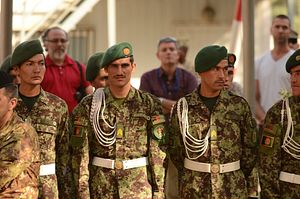August 8, 2015 was the bloodiest day for Afghanistan’s capital in years. Three bombings in Kabul– outside a U.S. military base, an Afghan army compound, and a police academy – left over 50 dead and 500 wounded. Most of the victims were civilians, despite the nature of the targets. It was the worst day for civilian casualties since data began being collected in 2009, the UN mission in Afghanistan said.
Two days later, on August 10, China’s ambassador to Afghanistan, Deng Xijun, held what Pajhwok Afghan News called a “marathon meeting” with Afghan National Security Adviser Mohammad Hanif Atmar. During the discussion, Pajhwok reported, Deng offered China’s condolences over the recent bombings in Kabul. He also said that China was ready to offer equipment and support to Afghanistan’s security forces.
As The Diplomat has previously covered, China is stepping up its support for Afghanistan as the U.S.-led NATO mission winds down, leaving Afghan forces in control of their country’s security. China, which shares a border with Afghanistan, is concerned that instability in the country could spill over into the broader South and Central Asia region – including China’s own Xinjiang Uyghur Autonomous Region.
As a result, China has pledged more aid for the government in Kabul. When new President Ashraf Ghani made his first visit to China in October, he left with promises from Beijing to provide 2 billion RMB ($327 million) in aid through 2017 and to provide training for 3,000 Afghan professionals. When Chinese President Xi Jinping met Ghani again, this time on the sidelines of the Shanghai Cooperation Organization summit in Russia, he again pledged that “China will continue to supply Afghanistan with security supplies, technology, equipment and training assistance.”
Still, Beijing has been reluctant to provide the sort of military aid that Kabul most wants. So far, China’s involvement has been limited to the two areas Deng mentioned: providing equipment and support (usually through training) for Afghan forces. In practice, China has taken care to limit its involvement in the actual conflict by mostly providing police – rather than military – training and nonlethal security equipment.
Instead, China has concentrated its efforts on trying to breathe life into moribund peace talks between the government in Kabul and the Taliban. In November 2014, China put forward a proposal to restart the peace talks. Since then, reports indicate that China hosted Taliban representatives for informal talks, in late 2014 and May 2015, in hopes of moving the peace process along. The move toward trilateral talks, involving Kabul, the Taliban, and the Pakistani government – believed to have major sway over the Taliban – are also attributed to China’s efforts, as Beijing likely nudged Islamabad to take part.
Talks hit a snag, however, in late July, with the news that Taliban leader Mullah Mohammed Omar has been dead for two years. With the knowledge that Omar is dead, the Taliban may fracture, making peace talks even more difficult. Shortly after the news broke, a round of peace talks scheduled to be held in Pakistan on July 31, was cancelled – much to China’s chagrin. Foreign Ministry spokesperson Lu Kang said that China “understands the postponement” but also urged “relevant parties to have national unity and enduring peace of Afghanistan in mind, and press ahead with the peace reconciliation process.”
As my colleague Catherine Putz discussed, with the Taliban claiming responsibility for the deadly bombings in Kabul, however, peace talks are becoming less and less likely. In a press conference after the bombings, Ghani said that “the war methods have changed against Afghans. The peace process is facing new questions.” Ghani seemed particularly disillusioned about Pakistan’s commitment to the peace talks, warning that “We can no longer tolerate to see our people bleeding in a war exported and imposed on us from outside….We hoped for peace, but war is declared against us from Pakistani territory.”
China is still trying to revive the possibility of negotiations; Deng reportedly told Atmar that China remains in favor of the peace talks and wants differences resolved through negotiations. But should talks finally collapse, China may have to make a hard choice: between letting instability spread in Afghanistan, or compromising its own principles of non-interference to provide greater military assistance to Kabul’s security forces.
































